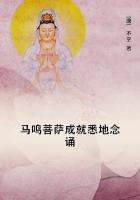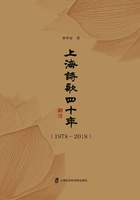I suppose after all that no one whose mind was not, to put it mildly, abnormal, ever yet aimed very high out of pure malice aforethought. I once saw a fly alight on a cup of hot coffee on which the milk had formed a thin skin; he perceived his extreme danger, and I noted with what ample strides and almost supermuscan effort he struck across the treacherous surface and made for the edge of the cup--for the ground was not solid enough to let him raise himself from it by his wings. As I watched him I fancied that so supreme a moment of difficulty and danger might leave him with an increase of moral and physical power which might even descend in some measure to his offspring. But surely he would not have got the increased moral power if he could have helped it, and he will not knowingly alight upon another cup of hot coffee. The more I see the more sure I am that it does not matter why people do the right thing so long only as they do it, nor why they may have done the wrong if they have done it. The result depends upon the thing done and the motive goes for nothing. I have read somewhere, but cannot remember where, that in some country district there was once a great scarcity of food, during which the poor suffered acutely; many indeed actually died of starvation, and all were hard put to it. In one village, however, there was a poor widow with a family of young children, who, though she had small visible means of subsistence, still looked well-fed and comfortable, as also did all her little ones. "How," everyone asked, "did they manage to live?" It was plain they had a secret, and it was equally plain that it could be no good one; for there came a hurried, hunted look over the poor woman's face if anyone alluded to the way in which she and hers throve when others starved; the family, moreover, were sometimes seen out at unusual hours of the night, and evidently brought things home, which could hardly have been honestly come by. They knew they were under suspicion, and, being hitherto of excellent name, it made them very unhappy, for it must be confessed that they believed what they did to be uncanny if not absolutely wicked; nevertheless, in spite of this they throve, and kept their strength when all their neighbours were pinched.
At length matters came to a head and the clergyman of the parish cross-questioned the poor woman so closely that with many tears and a bitter sense of degradation she confessed the truth; she and her children went into the hedges and gathered snails, which they made into broth and ate--could she ever be forgiven? Was there any hope of salvation for her either in this world or the next after such unnatural conduct?
So again I have heard of an old dowager countess whose money was all in Consols; she had had many sons, and in her anxiety to give the younger ones a good start, wanted a larger income than Consols would give her. She consulted her solicitor and was advised to sell her Consols and invest in the London and North-Western Railway, then at about 85. This was to her what eating snails was to the poor widow whose story I have told above. With shame and grief, as of one doing an unclean thing--but her boys must have their start--she did as she was advised. Then for a long while she could not sleep at night and was haunted by a presage of disaster. Yet what happened?
She started her boys, and in a few years found her capital doubled into the bargain, on which she sold out and went back again to Consols and died in the full blessedness of fund-holding.
She thought, indeed, that she was doing a wrong and dangerous thing, but this had absolutely nothing to do with it. Suppose she had invested in the full confidence of a recommendation by some eminent London banker whose advice was bad, and so had lost all her money, and suppose she had done this with a light heart and with no conviction of sin--would her innocence of evil purpose and the excellence of her motive have stood her in any stead? Not they.
But to return to my story. Towneley gave my hero most trouble.
Towneley, as I have said, knew that Ernest would have money soon, but Ernest did not of course know that he knew it. Towneley was rich himself, and was married now; Ernest would be rich soon, had bona fide intended to be married already, and would doubtless marry a lawful wife later on. Such a man was worth taking pains with, and when Towneley one day met Ernest in the street, and Ernest tried to avoid him, Towneley would not have it, but with his usual quick good nature read his thoughts, caught him, morally speaking, by the scruff of his neck, and turned him laughingly inside out, telling him he would have no such nonsense.
Towneley was just as much Ernest's idol now as he had ever been, and Ernest, who was very easily touched, felt more gratefully and warmly than ever towards him, but there was an unconscious something which was stronger than Towneley, and made my hero determine to break with him more determinedly perhaps than with any other living person; he thanked him in a low hurried voice and pressed his hand, while tears came into his eyes in spite of all his efforts to repress them. "If we meet again," he said, "do not look at me, but if hereafter you hear of me writing things you do not like, think of me as charitably as you can," and so they parted.
"Towneley is a good fellow," said I, gravely, "and you should not have cut him."
"Towneley," he answered, "is not only a good fellow, but he is without exception the very best man I ever saw in my life--except," he paid me the compliment of saying, "yourself; Towneley is my notion of everything which I should most like to be--but there is no real solidarity between us. I should be in perpetual fear of losing his good opinion if I said things he did not like, and I mean to say a great many things," he continued more merrily, "which Towneley will not like."
A man, as I have said already, can give up father and mother for Christ's sake tolerably easily for the most part, but it is not so easy to give up people like Towneley.














